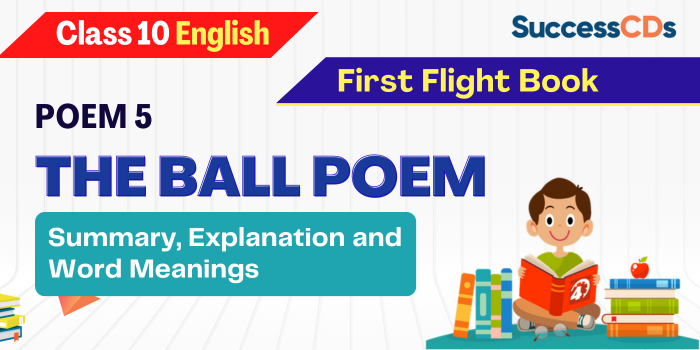
By Ruchika Gupta
CBSE Class 10 English Poem ‘The Ball Poem’, Line by Line Explanation along with Difficult Word Meanings and Literary Devices from First Flight Book
The Ball Poem – Here is the Class 10 English First Flight Poem 5 The Ball Poem Summary and Detailed explanation of the poem along with meanings of difficult words. Also, the explanation is followed by the literary devices used in the Poem.
- The Ball Poem Theme
- The Ball Poem Introduction
- The Ball Poem Summary
- The Ball Poem Summary in Hindi
- The Ball Poem Explanation
- The Ball Poem Video Explanation
Related:
- Class 10 The Ball Poem Question Answers (Important)
- The Ball Poem Character Sketches
- The Ball Poem MCQ Questions
The Ball Poem Class 10 English
by John Berryman

The Ball Poem Theme
John Berryman’s poetry “The Ball Poem” has childhood, grief, and the quest for innocence as its themes. The poem expresses the speaker’s nostalgia for those carefree, innocent days when he or she used to play with a ball. The poem also explores themes of mortality and the inevitable loss of youth’s unfettered joys as a result of growing up. The importance of learning the ways to accept loss and keep on moving with life.
The Ball Poem Introduction
The poet John Berryman through his poem, ‘The ball poem’ has described the reality of life which everyone has to face one day. He has touched the topic of how to stand up against the miseries and sorrows of life.
The Ball Poem Summary
The Ball Poem Summary – The poet is talking about a little boy who has lost his ball. He was playing with his ball. The ball skipped from his hand and went into the nearby water body. The poet says that this sight of the boy losing his favorite ball made him think about the boy and his reaction to this situation. He further says that the boy was helplessly looking into the water where his ball had gone. He was sad and was trembling with fear. He got so immersed in his sorrow that he kept standing near the harbour for a very long time and kept on looking for his ball. The poet says that he could console him that he may get new balls or he could also give him some money to buy another ball. But he stops himself from doing so because he thinks that the money may bring a new ball but will not bring the memories and feelings attached to the lost ball. He further says that the time has come for the boy to learn his responsibilities. Here the poet wants to say that now the boy will learn the toughest lesson of life. The lesson of accepting the harsh realities of life that one day we will lose our loved ones and our loved things.
The Ball Poem Summary in Hindi
कवि एक छोटे लड़के के बारे में बात कर रहा है जिसने अपनी गेंद खो दी है। वह अपनी गेंद से खेल रहा था। गेंद उसके हाथ से छूट कर पास के जलाशय में चली गई। कवि का कहना है कि लड़के की अपनी पसंदीदा गेंद को खोने की इस दृष्टि ने उसे लड़के और इस स्थिति पर उसकी प्रतिक्रिया के बारे में सोचने पर मजबूर कर दिया। वह आगे कहते हैं कि लड़का बेबस होकर उस पानी में देख रहा था जहां उसकी गेंद गई थी। वह उदास था और डर से कांप रहा था। वह अपने गम में इस कदर डूबा हुआ था कि वह बहुत देर तक बंदरगाह के पास खड़ा रहा और अपनी गेंद को ढूंढता रहा। कवि कहता है कि वह उसे सांत्वना दे सकता है कि उसे नई गेंदें मिलें या वह उसे दूसरी गेंद खरीदने के लिए कुछ पैसे भी दे सकता है। लेकिन वह खुद को ऐसा करने से रोकता है क्योंकि वह सोचता है कि पैसा नई गेंद ला सकता है लेकिन खोई हुई गेंद से जुड़ी यादें और भावनाएं नहीं लाएगा। वह आगे कहते हैं कि समय आ गया है कि लड़के को अपनी जिम्मेदारियां सीखें। यहाँ कवि कहना चाहता है कि अब लड़का जीवन का सबसे कठिन पाठ सीखेगा। जीवन की कठोर वास्तविकताओं को स्वीकार करने का सबक कि एक दिन हम अपनों और अपनों को खो देंगे।
The Ball Poem Video Explanation
The Ball Poem Explanation

POEM :
What is the boy now, who has lost his ball,
What, what is he to do? I saw it go
Merrily bouncing, down the street, and then
Merrily over — there it is in the water!
Word Meaning :
Merrily: cheerful
Bouncing: jumping up and down
Explanation of the poem passage above: The poet is talking about a boy who has lost his ball. He wants to know about him and his reaction because he has lost his ball. Further, he asks to himself that what this boy will do after losing his ball. The poet has seen the ball going away from the boy. He says that the ball was cheerfully jumping up and down in the street. This means that when the ball skipped from boy’s hand it went into the street and later on, it fell into the nearby river.
Literary devices:
Anaphora: use of repeated words in two or more lines (What is the boy… what, what and merrily bouncing… merrily over)
Assonance: repeated use of vowel ‘o’ (boy, now, who, lost)
Imagery: when poet says merrily bouncing down the street
repetition: ‘what’ is repeated

POEM :
No use to say ‘O there are other balls’:
An ultimate shaking grief fixes the boy
As he stands rigid, trembling, staring down
All his young days into the harbour where
His ball went. I would not intrude on him;
A dime, another ball, is worthless. Now
He senses first responsibility
Word Meaning :
Grief: sorrow
Rigid: fixed
Trembling: shaking
Harbour: dock, port
Intrude: invader
Dime: 10 cents (U.S)
Worthless: valueless, useless
Explanation of the poem passage above: The poet says that there is no benefit of consoling the boy by saying that he will get another ball because he has other balls too. He says so because the boy is feeling very sad. He is completely surrounded by sorrow. He is sad because all the memories of the childhood days went down the harbour with the ball. Here the poet says that the boy is very sad as the ball which has now gone into the water reminds him of those sweet memories, of the times when he owned it. This loss is unbearable for him and he is grief stricken. The poet says that he can’t even tell the boy to take some money from him in order to buy another ball. He says so because the new ball will not bring the sense of belonging to the boy. Further, the poet says that the time has come for the boy to learn the responsibility of taking care of his things.
Literary devices:
Repetition: use of word ‘ball’
Asyndeton: no use of conjunction in a sentence (A dime, another ball, is worthless)
POEM :
In a world of possessions. People will take
Balls, balls will be lost always, little boy.
And no one buys a ball back. Money is external.

He is learning, well behind his desperate eyes,
The epistemology of loss, how to stand up
Knowing what every man must one day know
And most know many days, how to stand up.
Word Meaning :
Possessions: ownership
External: Here, things with which feelings are not attached
Desperate: hopeless
Epistemology: The Greek word episteme means ‘knowledge’
Explanation of the poem passage above: Here the poet says that the boy has to learn that in this materialistic world, many of his belongings will be lost. He personifies the ball as his belongings, be it the worldly things or the relationships he is in possession of. So, he says that he has to learn to live without them no matter what. He says no one can buy back such things for him. The poet said so because according to him money can’t buy you everything. If it does buy you some materialistic thing, still, it will not be able to buy the sense of belongingness. He says that the boy is learning how to stand up against the sense of lost things. This means that the boy is trying to learn the real truth of life which states that you have to accept the miseries of life and stand up again. This is the truth which everyone has to learn in his or her life. The harsh truth of standing up against the odd miseries of life that everyone has to bear.
Literary devices:
Alliteration: use of sound ‘b’ at the start of two consecutive words (buys a ball back)
Assonance: use of vowel sound ‘e’ (He is learning, well behind his desperate eyes)
Repetition: ‘ball’ word is repeated
Rhyme scheme: There is no rhyme scheme followed in the poem.
Also see:
- Class 10 English Syllabus
- CBSE Class 10 English Lesson Explanation, Summary
- CBSE Class 10 English Important Questions (Chapter wise)
- Character Sketches of Class 10 English
- CBSE Class 10 English MCQs
- Class 10 English First Flight word meanings
- Class 10 English First Flight Poems word meanings
- Class 10 English Footprints without Feet word meanings
- Poetic Devices in Poems of First Flight book
- Class 10 English Complete Study Guide